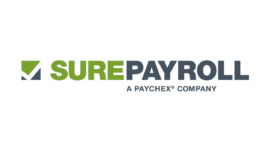
If you recently hired a nanny, gardener, or private in-home nurse, the federal government considers you a household employer. Like any other type of employer, household employers must withhold payroll taxes from their workers’ paychecks, pay the federal unemployment tax, and pay the employer half of an employee’s Medicare and Social Security taxes (FICA tax).
These complicated financial tasks can be hard to understand, which is why many parents choose to use nanny payroll software that calculates and files payroll taxes on their behalf. Below, we list some of the best nanny payroll tax services for parents and other household employers who would rather spend their time on something other than complicated tax laws.
Jump to:
| SurePayroll | HomePay | GTM Payroll Services | Poppins Payroll | RUN Powered by ADP | |
|---|---|---|---|---|---|
| Starting price | $49.99/mo. | $59/mo. | $70/mo. | $49/mo. | Custom |
| Free trial | 2 mos. | Yes | Yes | 30 days | Yes |
| Direct deposit and paper check payment options | Direct deposit only | Yes | Yes | Yes | Yes |
| Automatic tax remittance to the IRS | Yes | Yes | Yes | Yes | Yes |
| End-of-year tax form preparation | Yes | Yes | Yes | Yes | No |
| Availability in all 50 U.S. states | Yes | Yes | Yes | Yes | Yes |
SurePayroll is an affordable, fully featured option for parents who want every aspect of payroll taken off their hands. The nanny payroll version of the company’s small-business payroll software service automates tax filing, paycheck calculation, direct deposit and state new-hire reporting (a mandatory requirement for all household employers). It also generates a Schedule H tax form — a.k.a. Form 1040 for household employment taxes — that household employers must submit with other tax forms at the end of each financial year.
Unlike many other nanny payroll providers, SurePayroll doesn’t have any add-on fees for tax filing, such as end-of-year tax form preparation. While it doesn’t have 24/7 customer service, its customer support team is based in the U.S. and is available evenings and weekends. You don’t have to sign a year-long contract to use its services; instead, you pay month to month, which gives greater flexibility to household employers who hire workers seasonally.
SurePayroll charges a flat rate of $49.99 per month for its nanny payroll service. SurePayroll is one of the only nanny payroll providers that doesn’t charge extra fees for year-end tax preparation, account setup, or tax remittance to the IRS. It also has a one-month free trial.
A few additional fees include multi-state tax filing ($9.99 per additional state) and a fee for more than one employee ($10 per month per extra employee).
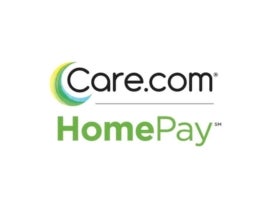
HomePay is a nanny payroll service owned by Care.com. Along with automatic paycheck calculation and payroll tax remittance, HomePay onboards employees on your behalf. Your employees can use HomePay’s app to accrue paid time off and get reimbursed for their expenses.
After HomePay sets up your employees’ payroll accounts, your workers can contact HomePay directly for customer support. Employers also get unlimited customer service as well as help in a potential audit. The company will act as your point of contact for all state tax agencies, meaning it will receive and manage all state tax notices so you have one less tax task to deal with.
HomePay starts at $59 a month for basic services, which include employee onboarding, basic payroll and tax preparation and remittance. HomePay’s more robust plan starts at $75 per month, though the service is billed quarterly at $300 per quarter.
HomePay also charges an additional $100 fee for end-of-year tax preparation, which includes Schedule H, 1040, W-2, and W-3 tax-form preparation.
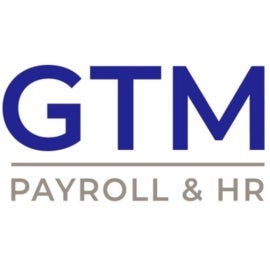
GTM Payroll Services takes care of every part of household payroll on your behalf. It also goes the extra mile to help customers understand their new role as household employers. Educational materials on GTM Payroll Services’ site include a free nanny paycheck calculator, information on creating an Employer Identification Number, a guide to household workers’ rights and a list of household employer obligations by state.
If your U.S. state requires you to have workers’ compensation insurance, GTM Payroll Services can match you with an insurance provider and integrate your premium payments with your payroll software. The nanny tax service can also help you understand laws governing workers’ compensation in your state.
GTM Payroll Services starts at $70 per month for one employee. Each additional employee you pay adds an extra $20 to your monthly price. GTM also has a year-end tax-filing fee of around $120, though the service is optional and you can prepare taxes yourself with no penalty.
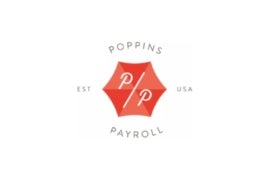
Apart from SurePayroll, Poppins Payroll has the fewest add-on fees of any nanny tax service on our best-of list. In contrast to most other payroll solutions, it has a 30-day free trial without charging a sign-up fee, end-of-year tax preparation fee or direct deposit fee. Along with being one of the cheapest nanny payroll services, Poppins Payroll’s nanny payroll service is more versatile than most (for instance, it offers employee payment options like paper checks or direct deposit instead of one or the other).
Poppins Payroll costs a $49 per month flat fee, which makes it the cheapest nanny payroll service on our list.
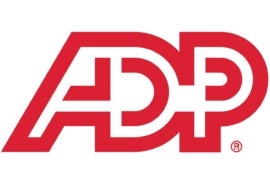
ADP is one of the biggest names in global payroll, but on top of its enterprise-level payroll solutions, it has small-business payroll software that doubles as an effective nanny tax service. ADP’s software product, RUN Powered by ADP, comes with a comprehensive mobile app that employers can use to run payroll from anywhere and employees can use to update their tax information and clock in and out.
Apart from its ease of use, ADP’s biggest strength is in how many employee benefits it offers. Household employers can choose from healthcare plans, 401(k) retirement accounts and dental and vision health insurance. The company’s 24/7 customer support and three-month free trial also help ADP stand out from the crowd.
For more information on ADP, read our comprehensive ADP payroll software review.
ADP doesn’t list pricing for any of its payroll software plans online. Contact ADP’s customer service team directly for a personalized quote.

HomeWork Solutions is another nanny payroll service tailored directly toward household employers. The company has two plans: A payroll tax-only plan that leaves paying your employee up to you, or a complete payroll plan that combines payroll-tax administration with employee pay management.
HomeWork Solutions has add-on fees that providers like Poppins Payroll and SurePayroll lack, such as a year-end tax form fee and a one-time setup fee. Additionally, if you use HWS for both tax administration and employee payments, you can only opt for weekly or biweekly pay schedules. Most other services have free unlimited payroll runs, meaning you can pay your employee as many times as you want each month without being charged extra.
HomeWork Solutions has two plans:
HomeWork Solutions also charges several additional fees, including a $110 fee for year-end payroll tax filing and a $110 setup fee for new users.

Paychex is a major player in the world of payroll for businesses, but its software product, Paychex Flex, can work for nanny payroll too. As a full-service payroll system, Paychex calculates your household employee’s paycheck, deposits it automatically and calculates and remits taxes to the government. Its stellar mobile app for employees makes clocking in and out easy and gives workers quick, easy access to their pay stubs and tax documents.
However, since Paychex Flex is tailored toward small-business payroll (rather than specific to household employers), its interface will have a steep learning curve for most parents. Much like ADP, it also has far more tools than most household employers need, especially those who have one part-time worker rather than a fleet of home employees. Still, it might be a good pick for employers who want to offer a handful of affordable benefits to employees.
Paychex has three main payroll plans for small businesses and household employers:
The first plan, Paychex Flex Essentials, should have enough basic payroll features to suit most household employers. The second- and third-tier plans are better for employers who want to offer more benefits with thorough HR support, though these plans are geared toward small and midsize business owners rather than parents.
While there are key differences between payroll solutions, most nanny payroll services should include a mix of the following features.
If you’re comfortable filing taxes yourself and prefer to save money on nanny software, you can find cheaper DIY tax software options (or even free payroll solutions) that calculate paychecks and tax deduction amounts, but leave the actual filing up to you.
However, figuring out the nanny tax is hypothetically the most burdensome part of hiring a household worker. Consider prioritizing nanny tax software that calculates and files taxes for you.
Most payroll software solutions include direct deposit as their main employee payment method. However, while direct deposit is one of the simplest ways to pay your employees on time, it’s not always the best option for all employers and employees. If you want to offer more payment options to your employees, look for software with direct deposit, paper check and even prepaid debit card options.
Like other employees, household workers are entitled to overpay if they’re paid hourly and their work week exceeds 40 hours. Time-tracking software is the easiest way for both you and your employees to make sure workers are being compensated for their actual hours worked while keeping you compliant with federal law. Some time-tracking tools also let you set up paid time off and sick leave policies based on your employees’ hours worked.
While household employers aren’t legally obligated to offer employee benefits like health insurance and 401(k) retirement plans, some choose to offer benefits to attract top talent or retain employees.
Your nanny payroll company’s customer support team should be available to help both you and your household employees. Ideally, your team is available round the clock or else on an extended schedule that includes weeknights and some weekend hours. You might also consider choosing a nanny tax service that works directly with your employees to set up their time tracking and payroll software.
Employees need to access their tax data, hours worked, pay stubs and direct deposit information. Usually, the most convenient way for them to do so is through a mobile app, or at least through a mobile-friendly website. Whether through an app or website, employees should be able to manage their own data independently.
Generally speaking, the only household employment taxes you need to worry about are the following two:
Along with correctly withholding their employees’ FICA taxes and remitting them to the federal government, employers must match their employees’ FICA taxes dollar for dollar.
For the 2023 tax year, the Social Security tax rate is 6.2% while the Medicare tax rate is 1.45%. You’ll need to match whatever dollar amount your employee’s tax rate adds up to with each paycheck.
Employers are also responsible for paying FUTA taxes, which are unemployment insurance taxes. These taxes are paid solely by employers, not by their employees. You may also need to pay a state unemployment insurance tax depending on which state you live in.
Nanny payroll tax software can help you calculate FICA taxes, including the employee and employer portion of the tax, as well as FUTA taxes, then deposit those taxes by their tax payment deadlines.
While household employers don’t have to withhold and file income taxes for their employees, your employee might as you to do so. Nanny payroll services can typically help you tackle this task as well.
The right payroll software for your household will depend on a variety of key considerations. First, ask yourself how much you’re willing and able to pay for a nanny tax service. Don’t forget to look into sneaky add-on fees, especially setup and end-of-year tax-filing costs, and include those in your overall nanny payroll budget.
Next, look at features. Would you rather have software that automatically runs payroll on a pre-set schedule, or would you prefer to run payroll yourself each pay period so you can double-check for accuracy? Do you value tools like mobile payroll apps, or are you happy enough with an online interface only? Asking these types of questions can help you narrow down which payroll software is right for you.
To write this piece, we only looked at business payroll software with household employment options and at nanny payroll-only companies. We then ranked our payroll software picks using the following factors:
To gather this information, we talked to customer service reps to get pricing and plan information, thoroughly reviewed each provider’s website, read aggregate customer reviews and considered demos and YouTube how-to videos whenever they were available.
If you employ a nanny, the IRS considers you a household employer, which means you’re responsible for withholding key payroll taxes from your nanny’s paycheck. You must also pay employer-only taxes, such as the employer portion of Medicare and Social Security taxes, plus federal and state unemployment taxes.
Understanding these new tax obligations can be challenging at best, as can preparing and filing the correct quarterly and end-of-year tax forms. A nanny payroll service will automatically calculate your nanny’s payroll taxes. The most comprehensive nanny payroll software will also withhold and remit those taxes to the federal government on the appropriate cadence.
Most nanny payroll services also prepare necessary end-of-year tax forms, though most charge an additional fee for tax form preparation. (Poppins Payroll and SurePayroll, which don’t charge extra for end-of-year tax form prep, are key exceptions.) Additionally, nanny payroll software typically calculates nanny paychecks and can pay your household employee automatically through direct deposit or paper check.
In short, having a nanny payroll service can ensure you pay your nanny on time and fulfill your new tax obligations with as little stress as possible.
No. Regular payroll services are intended for businesses, not households, and don’t offer the features household employers need to pay their employees. Some regular payroll providers, such as Paychex and SurePayroll, offer nanny-payroll versions of their regular software. Other nanny payroll providers, such as HomePay and HomeWork Solutions, are nanny-payroll specific.
You should give your nanny a W-2 form, not a 1099 form, when they first start working for you.
The first step to setting up payroll for your nanny is to apply for an employer identification number online. You should also have your nanny fill out a W-2 form.
The easiest way to set up payroll for your nanny is by subscribing to a nanny payroll service. Many nanny payroll services automate every aspect of paying a nanny or other in-house employee, including calculating paychecks, paying your nanny through direct deposit and filing employment taxes on a regular basis.